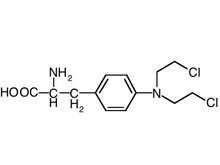Definition
Melphalan is an anticancer (antineoplastic) agent. It also acts as a suppressor of the immune system. It is available under the brand name Alkeran.
Purpose
Melphalan is primarily used to treat ovarian cancer and multiple myeloma, which is a type of cancer of the bone marrow.
Although not specifically labeled for use in the treatment of these cancers, melphalan is also used in some patients with:
- breast cancer
- cancers of the blood and lymph system
- endometrial cancer
- malignant melanoma
- Waldenström's macroglobulinemia
Description
Melphalan is a nitrogen mustard derivative and belongs to the group of alkylating anticancer agents. It chemically interferes with the synthesis of genetic material (DNA and RNA) of cancer cells, which prevents these cells from being able to reproduce and continue the growth of the cancer.
Recommended dosage
Melphalan may be taken either orally in pill form or as an injection in liquid form. The dosage prescribed may vary widely depending on the patient, the cancer being treated, and whether or not other medications are also being taken.
A typical dosage for multiple myeloma is 6 mg per day for two to three weeks. After this initial dose, the drug is halted for up to 4 weeks, then resumed at a dose of 2 mg per day, depending on blood counts of the drug in the patient's blood test.
A typical dosage for ovarian cancer is 0.2 mg per kilogram (2.2 pounds) of body weight once per day for five days.
Precautions
Melphalan should be taken with food to minimize stomach upset. Melphalan should always be taken with plenty of fluids.
Melphalan can cause an allergic reaction in some people. Patients with a prior allergic reaction to melphalan should not take the drug.
Melphalan can cause serious birth defects if either the man or the woman is taking this drug at the time of conception, or if the woman is taking this drug during pregnancy. Also, male sterility is a possible side effect of melphalan. This sterility may either be temporary or permanent.
Because melphalan is easily passed from mother to child through breast milk, breastfeeding is not recommended while melphalan is being taken.
Melphalan suppresses the immune system and interferes with the normal functioning of certain organs and tissues. For these reasons, it is important that the prescribing physician is aware of any of the following pre-existing medical conditions:
- a current case of, or recent exposure to, chicken pox
- herpes zoster (shingles)
- a current case, or history of, gout or kidney stones
- all current infections
- kidney disease
Because melphalan is such a potent immunosuppressant, patients taking this drug must exercise extreme caution to avoid contracting any new infections. They should do their best to:
- avoid any person with any type of infection
- avoid any person who has received a polio vaccine in the last two months
- avoid bleeding injuries, including those caused by brushing or flossing the teeth
- avoid contact of the hands with the eyes or nasal passages unless the hands have just been washed and have not touched anything else since this washing
- avoid contact sports or any other activity that could cause a bruising or bleeding injury
Side effects
There are no common side effects of melphalan. However, side effects that may occur include:
- increased susceptibility to infection
- nausea and vomiting
- diarrhea
- mouth sores
- skin rash, itching, or hives
- swelling in the feet or lower legs
A doctor should be consulted immediately if the patient experiences black, tarry, or bloody stools, blood in the urine, persistent cough, fever and chills, pain in the lower back or sides, painful or difficult urination, or unusual bleeding or bruising.
Interactions
Melphalan should not be taken in combination with any prescription drug, over-the-counter drug, or herbal remedy without prior consultation with a physician. It is particularly important that the prescribing physician be aware of the use of any of the following drugs:
- amphotericin B
- antithyroid agents
- azathioprine
- chloramphenicol
- colchicine
- flucytosine
- ganciclovir
- interferons
- plicamycin
- probenecid
- sulfinpyrazone
- zidovudine
- any radiation therapy or chemotherapy medicines
KEY TERMS
- Antineoplastic
- A drug that prevents the growth of a neoplasm by interfering with the maturation or proliferation of the cells of the neoplasm.
- Neoplasm
- New abnormal growth of tissue.



